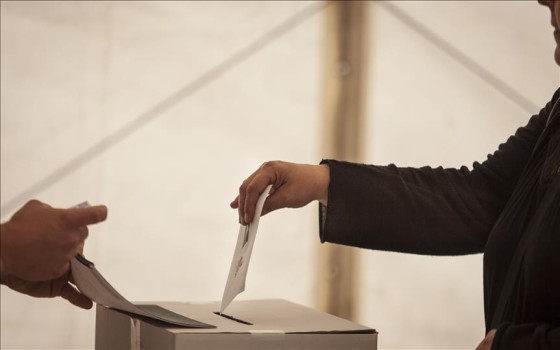
Election results showed Moldova chose the European Union. Some considered it a defeat for Russia.

- Europe and Arabs
- Monday , 29 September 2025 8:40 AM GMT
Brussels: Europe and the Arabs
In a report on the results of Sunday's elections in Moldova, Playbook Brussels, the European version of the American magazine Politico, said that as soon as the results were announced, Moldova's pro-Western government was poised to secure a renewed majority after a campaign marred by reports of widespread Russian interference in the electoral process. The report added on Monday morning that with more than 99.5% of the votes counted, the ruling Action and Solidarity party was heading for a decisive victory with 50.03% of the vote, compared to just 24.26% for the pro-Russian National Bloc party.
Dubious Deals: Ahead of Sunday's elections, warnings of a combination of tactics aimed at spreading fear and disinformation reached their peak. On election day itself, threats were made to polling stations (with tear gas fired at one in Romania), major media outlets were hacked, and police intervened to arrest groups accused of planning violent unrest. The report added, "The Moldovan embassy in Brussels, which was being used as an overseas polling station, was evacuated on Sunday while police investigated a bomb threat. This confirmed warnings from the country's security chief, who told Politico last month that "false bomb threats at polling stations in European cities" could be used to prevent pro-EU voters in the diaspora from casting their ballots.
"Moldovan President Maia Sandu is America," said an elderly woman, reprimanding the Islamic Party of Moldova leaflet distributors on Chisinau's main street. She declined to give her name or elaborate further, but the claim reflects Russia's offensive approach to Sandu. Meanwhile, Vlad, a businessman in his 30s, told Playbook that he does not support Moscow's invasion of Ukraine, but wants to see his country "neutral"—a tall order given the war raging next door.
According to disinformation experts, Moscow made no secret of its intentions to disrupt the election. According to Ksenia Iliuk, co-founder of LetsData, a Ukrainian company that provides intelligence on information operations, more than 700 influence operations were detected in the run-up to the election, many of them aimed at discrediting Sandu personally. “That’s how they fight—if the EU comes and builds a bridge, there’s not much you can do about it, but you can attack the person who represents the idea of EU accession.”
“What’s happening now in Moldova is just the beginning,” Alain Berset, Secretary General of the Council of Europe, told Playbook. “It’s a wake-up call. We’ve seen similar developments in other countries, and the question now is: What can be done to ensure that good democratic processes can exist in this new context? … Artificial intelligence, social media, foreign interference, disinformation, and deep fakes—they’re all here to stay.”
So do we! According to Siegfried Mureşan, a Romanian MEP and Chair of the Committee on Relations with Moldova, “Moldova’s pro-European victory is a lesson.” "To all of Europe, how to defeat Russian interference," a lesson other capitals should learn from. He added, "We must now move quickly and advance the European integration of the Republic of Moldova in line with the will of the people."












No Comments Found